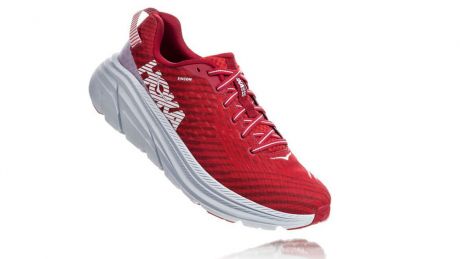You can trust Coach
If Hoka knows how to do one thing with its running shoes, it’s cram a load of cushioning on without making the shoe uncomfortably heavy. Even so, I was taken aback at how light the Rincon is – the men’s shoe is 218g and the women’s is 179g (weight will vary depending on size) – given the substantial wedge of EVA foam it sports.
That’s a promising start on paper, but with Hoka shoes the size of the cushioning sometimes means they feel a little cumbersome even if they’re light. That’s emphatically not the case with the Rincon, which feels positively nimble, especially when you start to quicken your pace.
The Rincon has a speedy and smooth heel-to-transition that feels good when plodding along at an easy pace, but really shines when you move up through the gears. Of all the runs I did in the Rincon – everything from short interval sessions and fast 5Ks to long runs and easy recovery efforts – it was long progression runs that really showed it at its best.
The combination of the smooth ride and ample cushioning makes it comfortable and quick when you’re looking to hold a fast pace over long distances, making it a great option for half marathon or marathon races. It’s just about nippy enough for 5Ks and 10Ks too.
I’d still shy away from using the Rincon regularly for recovery runs given the choice, just because it isn’t as cushioned as something like the Hoka Clifton 6, which is all about comfort. However, if you want one shoe to do it all then the Rincon is comfortable enough for easy days, and it can certainly fly on fast days.
See related
- Hoka Carbon X Running Shoe Review: A Great Long-Distance Trainer And Racer
- The Best Running Shoes Of 2021
- The Best Cushioned Running Shoes For Your Marathon Training
I preferred the ride of the Rincon to Hoka’s Carbon X shoe, which has a carbon plate in the midsole. Although the plate might help you hold your pace over a marathon distance race or longer, the lightness of the Rincon makes it feel speedier and it’s just a little more enjoyable to run in. The fact that the Rincon is £105 compared with £160 for the Carbon X more or less seals the deal if you are picking between the two.
Sterner competition is to be found among other brands, however. The past couple of years have seen a parade of brilliant all-rounder shoes, like the New Balance FuelCell Rebel: it’s bouncier than the Rincon and costs only a little more at £120, but I’d say it skews more firmly towards speed sessions and races, being less comfortable to use on easy runs than the Rincon.
The Nike Pegasus Turbo remains my favourite all-rounder shoe if money is no object, with a softer yet somehow faster ride than any other all-rounder I’ve run in, but since the Turbo costs £160 I’d definitely be tempted to opt for the Rincon and pocket the difference in the real world – when money is usually an object, after all.

Nick Harris-Fry is a journalist who has been covering health and fitness since 2015. Nick is an avid runner, covering 70-110km a week, which gives him ample opportunity to test a wide range of running shoes and running gear. He is also the chief tester for fitness trackers and running watches, treadmills and exercise bikes, and workout headphones.

